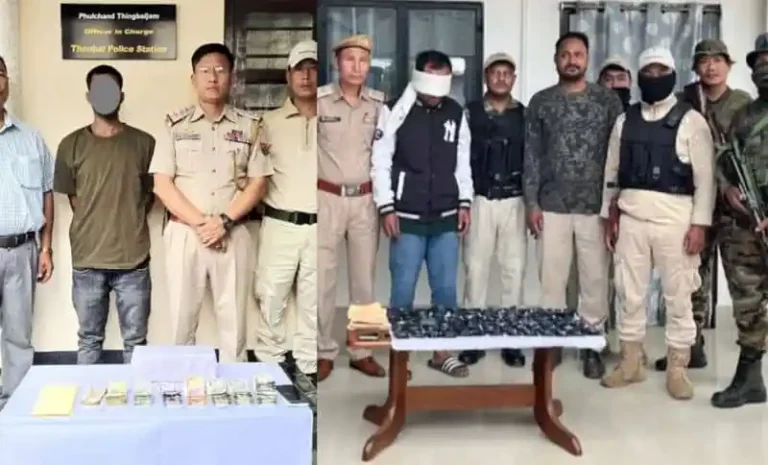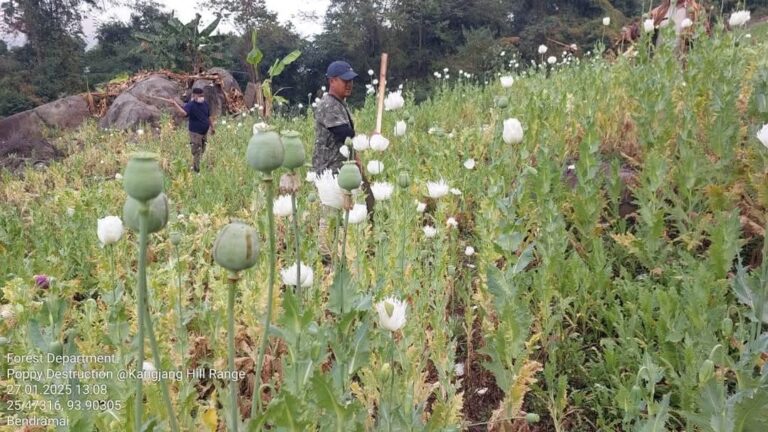Manipur’s Crackdown on Poppy Cultivation: A Step Towards a Drug-Free State
Summary
In a bold operation reflecting Manipur’s ongoing fight against narcotics, the police and forest department recently destroyed 55 acres of illegal poppy cultivation in Ukhrul district. This effort is part of the state’s broader “War on Drugs 2.0” campaign, which aims to eradicate drug-related activities by replacing illicit poppy farming with alternative livelihoods. Chief Minister N. Biren Singh lauded the initiative, underscoring the government’s commitment to eliminating drug cultivation and protecting local communities.
Manipur’s Fight Against Illegal Poppy Cultivation
The Problem: Poppy Cultivation and Its Impact
Poppy cultivation in Manipur has long been associated with the illegal drug trade, fueling societal and economic challenges. The state’s fertile hilly terrain is often exploited by organized groups for large-scale illegal farming, posing threats to public health, economic stability, and environmental balance.
But why has poppy farming thrived here? For many impoverished farmers, cultivating poppy offers quick monetary returns compared to traditional crops. This has made it a lucrative but unlawful choice, often overshadowing sustainable agricultural practices.
Recent Operations: A Look at the Numbers
The recent operation in Ukhrul destroyed poppy plants over 55 acres, showcasing a collaborative effort between the Manipur Police and forest department. This is not an isolated event. Over the years, such operations have led to the destruction of thousands of acres of poppy plantations across the state. For example:
- 10 acres were uprooted in Tamenglong district in October 2024【19】.
- The cumulative efforts have led to the eradication of over 19,000 acres of illegal poppy cultivation since 2017【20】.
These numbers highlight the scale of the problem and the government’s unwavering dedication to combatting it.
“War on Drugs 2.0”: A Holistic Approach
The state’s campaign, “War on Drugs 2.0,” isn’t just about uprooting illegal crops. It’s a multi-faceted approach aimed at:
- Cracking Down on Narcotics Trade: Law enforcement agencies, including the police, Narcotics Control Bureau, and local authorities, are working together to dismantle drug networks.
- Providing Alternative Livelihoods: Recognizing that poverty drives many farmers to illegal cultivation, the government is promoting high-value, sustainable crops like lemongrass and ginger as alternatives【20】.
- Public Awareness Campaigns: Educating communities about the harms of drug-related activities and encouraging them to adopt lawful agricultural practices.
Technological Interventions and Inspections
To strengthen these efforts, advanced tools such as Fourier-Transform Infrared Spectroscopy (FTIR) machines are being employed to analyze and detect narcotics【20】. Such measures ensure efficient identification and swift action against drug-related operations.
Challenges and Road Ahead
While these efforts have shown success, challenges persist. Many poppy plantations are in remote, inaccessible regions, making enforcement difficult. Additionally, organized crime networks often retaliate, posing risks to authorities and locals involved in these operations.
However, the government’s proactive stance—combining enforcement with community engagement—shows promise. Chief Minister N. Biren Singh’s commitment to replacing illicit farming with sustainable alternatives demonstrates the state’s focus on long-term solutions.
Why This Matters
Eradicating illegal poppy cultivation isn’t just about law enforcement—it’s about safeguarding the future of Manipur’s youth and preserving the state’s natural resources. By focusing on economic empowerment and sustainable practices, Manipur is setting an example for tackling drug-related issues holistically.
FAQs
- Why is poppy cultivation widespread in Manipur?
The state’s hilly terrain and poverty levels make it a hotspot for illegal farming, as poppy offers quick financial returns. - What is the “War on Drugs 2.0”?
It’s a state-led initiative aimed at eradicating drug cultivation and trade through enforcement, sustainable alternatives, and community awareness. - How successful have these operations been?
Since 2017, over 19,000 acres of illegal poppy plantations have been destroyed, signaling significant progress. - What crops are being promoted as alternatives?
High-value crops like lemongrass, ginger, and other horticultural options are being encouraged to replace poppy farming. - What role does technology play in these efforts?
Tools like FTIR machines help detect and analyze narcotics, enabling faster and more accurate enforcement.




